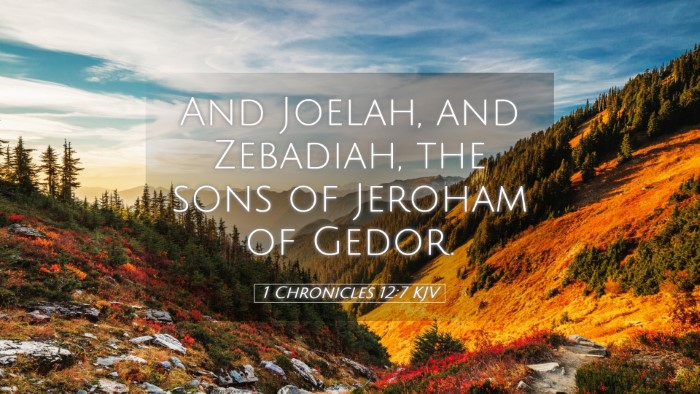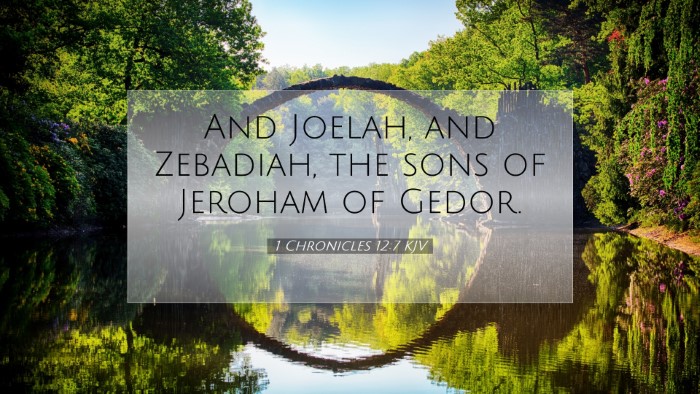1 Chronicles 12:7 Commentary
Verse: "And from the Gileadites there came of the mighty men of valour, and their captain was Amasa."
Introduction
This verse captures the essence of an important transition in the history of Israel, highlighting the significance of leadership and valor among the military ranks during a crucial period. It emphasizes the strength of the Gileadites and their contribution to King David's cause, which is instrumental for understanding the dynamics of Israel's monarchy.
Contextual Background
The context of 1 Chronicles, particularly Chapter 12, is vital for grasping the importance of the events described. This chapter lists the men who rallied to David while he was in Ziklag, indicating the various tribes and their leaders who recognized David as the anointed king of Israel. The Gileadites, known for their courage, play a significant role in providing military support during this time.
Insights from Public Domain Commentaries
Matthew Henry's Commentary
Matthew Henry focuses on the classification of David's supporters, specifically highlighting their valor. He points out that the Gileadites were noted for their strength and bravery, serving as exemplars of loyalty to David amidst a time of great uncertainty. Henry remarks that Amasa, their captain, embodies the qualities that God desires in leaders—courage, strength, and faithfulness. It was not merely numerical strength that mattered, but the quality of character that each of these warriors brought to the cause of David.
Albert Barnes' Notes on the Bible
Albert Barnes emphasizes the geographical and tribal significance of the Gileadites in his commentary. He notes that Gilead was a region associated with ruggedness and a warrior spirit. The Gileadites, as valiant men, signify the support from the east of Jordan, which was crucial in establishing a stronghold for David. Barnes highlights the fact that Amasa, a name known in later narratives related to Absalom’s rebellion, serves as a reminder of the complexities within David’s leadership, where alliances could shift based on loyalty and ambition.
Adam Clarke's Commentary
Adam Clarke provides additional historical context relating to Amasa's lineage as well as his eventual betrayal. Clarke remarks that Amasa was the son of Abigail, the sister of David. This familial connection illustrates the complexities of loyalty and kinship within the Israelite tribes. His commentary brings a profound understanding of the ramifications of selecting leaders from among one’s family or tribe, suggesting that while Amasa's valor was unquestionable, it was also significant that he could become a figure of conflict later in David’s life.
Thematic Insights
- Leadership and Valor: This verse accentuates that true leadership is characterized by courage and the ability to inspire others. Amasa’s role as a captain underscores the types of leaders that David attracted during his rise to power.
- The Power of Alliances: The collaboration of the Gileadites demonstrates the importance of forming alliances for achieving greater goals. The mention of their geographical identity reinforces how these alliances were formed through shared experiences and mutual recognition of David's kingship.
- Divine Providence: This passage can be viewed through the lens of God’s guiding hand upon David’s ascension to the throne. The gathering of such valiant men from various tribes illustrates God's orchestration in fulfilling His promises to David.
- Complexities of Loyalty: Amasa's later actions serve as a poignant reminder of how alliances can fracture and loyalties can be tested. Clerical reflections on this foreshadow future conflicts within David's reign.
Application for Today
For pastors, students, theologians, and Bible scholars, this verse serves as an encouragement to seek out and cultivate strong leaders within their congregations. The valor of the Gileadites inspires contemporary leaders to embody courage in the face of opposition and uncertainty. The importance of forming God-honoring alliances cannot be overstated in a world that often attempts to divide based on tribal affiliations or self-interest.
Moreover, this passage challenges modern believers to consider their own loyalties and the implications of their leadership choices. Just as David was supported by the Gileadites, today’s leaders are called to recognize the value of empowering those around them and the impact of their decisions, especially concerning family and close associates.
Conclusion
In capturing a moment of unity and strength among the Gileadites under the leadership of Amasa, 1 Chronicles 12:7 ultimately serves as a profound reminder of the importance of courageous leadership, steadfast alliances, and the acknowledgment of God’s providential guidance in the tumultuous journey of faith and community. This text can inspire contemporary church leaders to reflect on these themes as they guide their congregations toward a unified purpose in service to God.


